Dorota Danielewicz. Culture manager, Slavicist, author and journalist

Journalism in Polish and German
She owes her contact with the Parisian magazine “Kultura” to the writer Leszek Szaruga. Shortly after a series of readings in Berlin in 1995, Dorota Danielewicz reported on the event in Jerzy Giedroyc’s monthly magazine on his recommendation.[4] A few months later, in spring 1996, she wrote for “Kultura” about the presentation of Polish literature at the Leipzig Book Fair.[5]
Danielewicz had made her debut in German two years earlier and, together with Basil Kerski, published two series of reports on Polish regions near the German border in the “Berliner Zeitung”[6] in 1993 and in the “Tagesspiegel”[7] in 1995. Over time, Danielewicz began to be approached by Polish and German editors and commissioned to write articles that matched her profile. Shortly after Wisława Szymborska was awarded the Nobel Prize, she would write a portrait of her for the “Berliner Zeitung”[8]. She presented Olga Tokarczuk in a similar way in the “taz”[9]. She interviewed Herta Müller[10] for the Polish “Newsweek” and Olga Tokarczuk for the German weekly “Der Freitag”[11]. She had a knack for Nobel Prize winners. “Polityka” commissioned her to write a long text about the modern metropolis of Berlin[12]. She continues to publish regularly in the bilingual German-Polish magazine “Dialog” and has also written for publications such as “Tygodnik Powszechny” and “Gazeta Wyborcza”.
Years later, when Dorota Danielewicz’s own books became more widely known, the roles were reversed. Newspapers and radio stations from Warsaw and Berlin would interview Dorota and publish extensive portraits of her[13], and she was also invited to take part in documentary films about Berlin as a contemporary witness and publicist.[14] Together with her son Jan, Dorota Danielewicz appeared on the cover of “Wysokie Obcasy”, the magazine of the high-circulation “Gazeta Wyborcza”, in February 2020[15]. This magazine also nominated her as one of 12 candidates for “Superhero of the Year” (Superbohaterka roku) in 2020 because of the lessons in empathy contained in her book “Jans Weg” and her political engagement during the “women’s strike” in Poland.
Radio
Danielewicz began working with radio in 1996. Her former fellow student and co-founder of the “Polish Radio Magazine” (Polski Magazyn Radiowy) on “Radio Multikulti” on RBB and later on WDR, Jacek Tyblewski, offered her a job on the programme. He suggested recording interviews with writers she hosted in Berlin. It soon transpired that Dorota Danielewicz has both a radio voice and a talent for the medium. Tyblewski taught her how to cut recordings onto tapes, which were then wound onto discs. Her intensive radio adventure was to last until 2012. At “Radio Multikulti” she produced her own programmes, but also worked as a presenter and editor. She also presented her “literary magazine” (Magazyn Literacki) once a month, in which she published a total of almost 200 interviews with Polish writers.
In addition, she handled the telephone correspondence for the Polish department of “Radio France International” (RFI) in Paris for over 10 years until the closure of the French station in 2010. Once or twice a week she reported on important international events in the German capital. Although working in radio was her passion, Dorota Danielewicz decided to end her collaboration with RBB / Funkhaus Europa, the former “Radio Multikulti”, in 2012 for personal reasons.
In 2023, radio returned in a new format for Dorota Danielewicz, and she now dedicates herself to German-Polish relations in audio columns for “Deutschlandfunk Kultur”.
Editions
After giving up her job at “Magazyn Literacki”, Dorota Danielewicz’s focus on literature shifted from programmes and events to her own work. When her disabled son Jan turned 18, he began receiving round-the-clock care at a specialist residential centre. Her husband moved to Poland for work reasons and her second son left home to attend university. Now, Dorota Danielewicz was able to concentrate fully on writing.
She had already made a name for herself as a publisher and editor of books. In 1998 she published a bilingual anthology of Polish poetry with “Kirsten Gutke Verlag” in Cologne entitled “Kochać to, co niewidzialne. Das Unsichtbare lieben“[16]. In the epilogue, Danielewicz emphasises that the publisher “does not want to present a book of poetry from the first pages of the feuilleton, but rather names that are still largely unknown in Germany, poetry that is yet to be discovered.”[17] For more in-depth reading, you can choose from poems by Bohdan Zadura, Maciej Cisło, Krystyna Lars, Aleksander Jurewicz, Kazimierz Brakoniecki, Bronisław Maj, Anna Janko, Paweł Huelle, Zbigniew Machej, Hanna Kowalewska, Andrzej Stasiuk, Jakub Ekier, Marcin Świetlicki, Ewa Sonnenberg, Andrzej Sosnowski, Maciej Niemiec, who lives in Paris, and Alicja Rybałko, who lives in Vilnius.[18] The poets Piotr Sommer, Tomasz Jastrun and Marzanna Kielar would go on present their own volumes of poetry in Germany in the following years. Numerous authors from the anthology “Das Unsichtbare lieben” who were previously largely unknown in Germany would later actually be published in German-language literary magazines and in the culture section of newspapers.
In 2008, Danielewicz and Maciej Górny published the anthology “Berlin. Polnische Perspektiven. 19.–21. Jahrhundert”[19]. The book was published as part of the exhibition “My, berlińczycy. Wir Berliner”, which was presented by the Centre for Historical Research Berlin of the Polish Academy of Sciences (CBH PAN) in Berlin. Danielewicz and Górny spent two years in the archives collecting Polish-language texts and testimonies from people who had once lived in Berlin or spent time there temporarily. In addition to texts by writers such as Witold Gombrowicz or important musicians such as Artur Rubinstein or decades-old reports by journalists, the anthology also includes recollections by “ordinary” citizens.
These “non-obvious” texts about Berlin served as the inspiration for Dorota Danielewicz and Ewa Wanat to produce the bilingual audio guide “Berlinski Tour” about the city in the form of an app in 2023 under the auspices of the German-Polish Society[20], a guide to the often little-known Polish traces in the German capital. An expansion of the app is envisioned in cooperation with the planned German-Polish House in Berlin.
[4] Dorota Danielewicz: Granice poznania. Cykl spotkań autorskich w ramach “grenzenlos Warschau-Berlin” (jesień 1995), in: “Kultura” 1995/12/579, p. 83–89 – https://kulturaparyska.com/pl/search/searched-attachment/1964/2/dorota danielewicz-kerski#page=2&search=dorota danielewicz-kerski (accessed: 23/2/2023).
[5] Dorota Danielewicz: Polska książka w Lipsku. Impresje z wiosennych Targów Książki 28–31/3/1996, in: “Kultura” 1996/12/591, p. 100–103 – https://kulturaparyska.com/pl/search/searched-attachment/1980/52/dorota danielewicz - page=52&search=dorota danielewicz (accessed: 23/2/2023).
[6] The series of reports by Dorota and Basil Kerski in the “Berliner Zeitung” in 1993 was entitled “Entdeckungen östlich der Oder” [“Discoveries east of the Oder”] and consisted of eight texts. Example texts: Dorota and Basil Kerski: Der Kronprinz und die schöne Eleonore. Küstrin, in: “Berliner Zeitung” 21/25 from 5/7/1993; Dorota and Basil Kerski: Berliner Altar mitten im Naturreservat, in: “Berliner Zeitung” from 31/8/1992.
[7] A series of reports by Dorota and Basil Kerski, which was published in the “Tagesspiegel” in 1995, was entitled “Jenseits der Oder” [“Beyond the Oder”]. Example texts: Dorota and Basil Kerski: Zielona Góra. Ein Weinberg als Andenken, in: “Tagesspiegel” no. 15398 from 24/9/1995; Dorota and Basil Kerski: Chojna. Kirchenglöckchen der Versöhnung, in: “Tagesspiegel” no. 15411 from 8/10/1995.
[8] Dorota Kerski: “Kein Blatt fällt ohne meinen Willen”. Wisława Szymborska, die Grande Dame der polnischen Dichtung erhält den Literatur-Nobelpreis, in: “Berliner Zeitung” from 4/10/1996.
[9] Dorota Danielewicz: Die Wahrheit steckt in der Bewegung. Nobelpreisträgerin Olga Tokarczuk, in: “taz”, 10/12/2019. – https://taz.de/Nobelpreistraegerin-Olga-Tokarczuk/!5647913/(accessed: 23/2/2023).
[10] Herta Müller in an interview with “Newsweek”. Interviewed by Dorota Danielewicz, in: “Newsweek” (Warsaw), 15/4/2013.
[11] Dorota Kerski: “Landkarte realer und erträumter Welten”. Conversation with Olga Tokarczuk, in: “Der Freitag” from 12/10/2001.
[12] Dorota Danielewicz: Światowa stolica Niemiec, in: “Polityka” (special edition: Niezbędnik inteligenta, 10/2014) from 3/11/2014. – https://www.polityka.pl/niezbednik/1597637,1,swiatowa-stolica-niemiec.read (accessed: 23/2/2023).
[13] Lena Ackermann: Dorota Danielewicz. Wie ein polnisches Mädchen in Berlin ihr Zuhause fand, in: “Berliner Morgenpost” from 28/10/2014. – https://www.morgenpost.de/kultur/berlin-kultur/article133725685/Wie-ein-polnisches-Maedchen-in-Berlin-ihr-Zuhause-fand.html (accessed: 23/2/2023); Nicole Henneberg: Himmel über dem Markusplatz, in: “Tagesspiegel” 21/10/2014. – https://www.tagesspiegel.de/kultur/himmel-uber-dem-markusplatz-3595009.html (accessed: 23/2/2023); Katarzyna Kubisiowska: “Odszkodowanie od losu”. Rozmowa z Dorotą Danielewicz, in: “Tygodnik Powszechny” 7/2020, p. 29 from 16/2/2020.
[14] Berlin – Schicksalsjahre einer Stadt, Folge über 1981, Director. Anna Bilger, RBB 2019, https://www.rbb-online.de/berlin-schicksalsjahre/schicksalsjahre-1980-90/das-jahr-1981.html (accessed: 23/2/2023); Nieudacznicy, 2017, Director. Jacek Papis, https://www.youtube.com/watch?v=sGVScJBZ7zA (accessed: 23/2/2023).
[15] Violetta Szostak: Dorota Danielewicz: Dorota Danielewicz: Był czas, kiedy wyobrażałam sobie Jana wbiegającego po schodach i wołającego: “Mamo, jestem!” [There was a time when I imagined Jan running up the stairs and calling out: “Mum, I’m home!”], in: “Gazeta Wyborcza” (“Wysokie Obcasy”), 15/2/2020.
[16] Kochać to, co niewidzialne. Nowa poezja polska. Das Unsichtbare lieben. Neue polnische Lyrik. [Loving the invisible. New Polish Poetry.] Anthology. Selection and epilogue: Dorota Danielewicz-Kerski. Preface: Adam Zagajewski. Translated from German by: Henryk Bereska, Renate Schmidgall, Roswitha Matwin-Buschmann and Joanna Manc. Kirsten Gutke Verlag, Cologne 1998.
[17] Ibidem, p. 261.
[18] Leszek Szaruga: Świadectwo liryki, in: “Kultura” 1999/01/616-02/617, p. 210–213 – https://kulturaparyska.com/pl/search/searched-attachment/2088/107/dorota danielewicz#page=107&search=dorota danielewicz (accessed: 23/2/2023).
[19] Berlin. Polnische Perspektiven. 19.–21. Jahrhundert, published by Dorota Danielewicz-Kerski / Maciej Górny. Berlin Story Verlag, Berlin 2008.
[20] https://berlinski-tour.de/ (accessed: 23/2/2023).
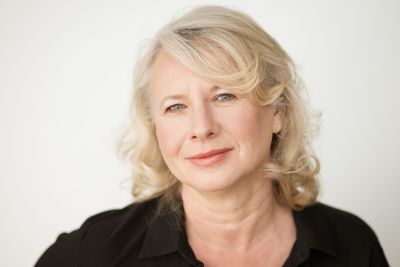
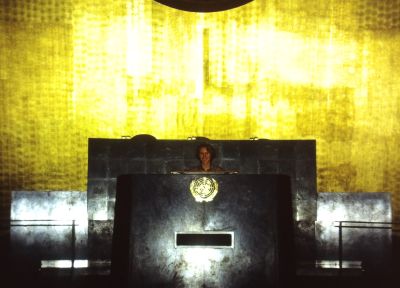
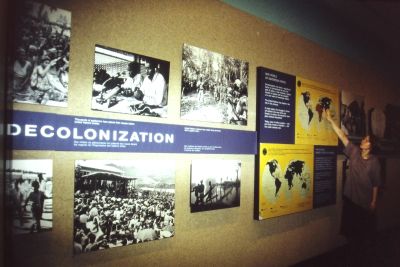
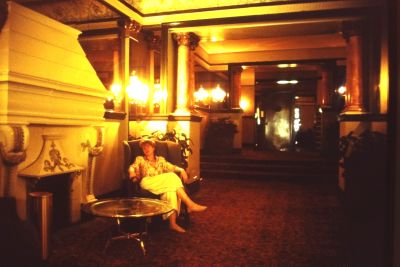
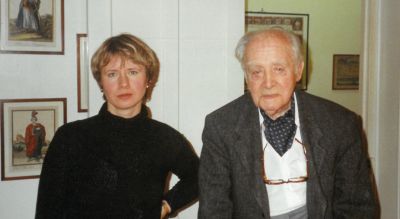
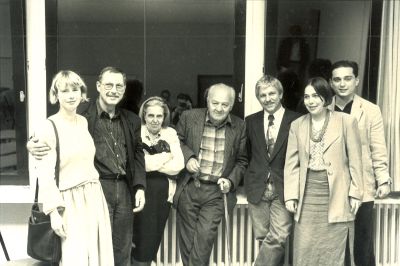

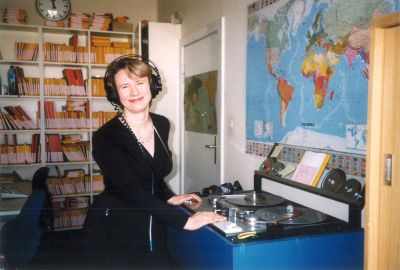
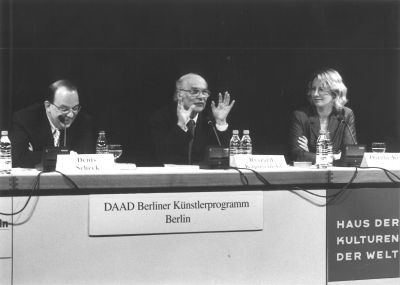
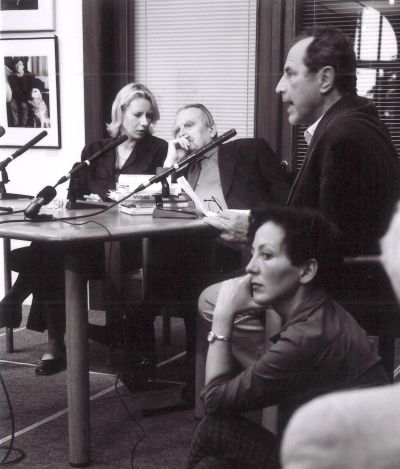
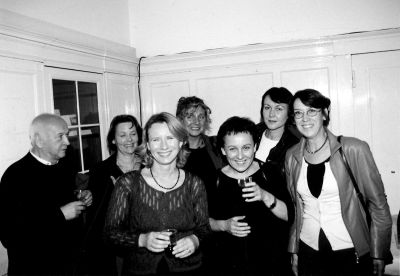
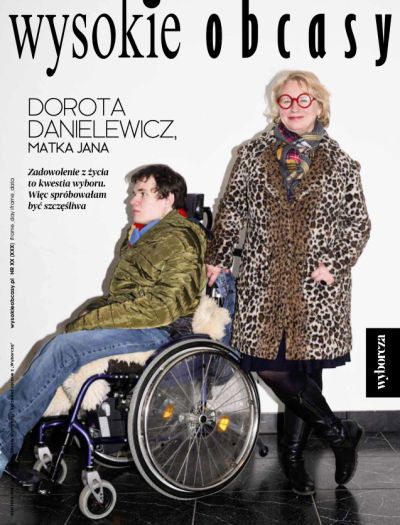
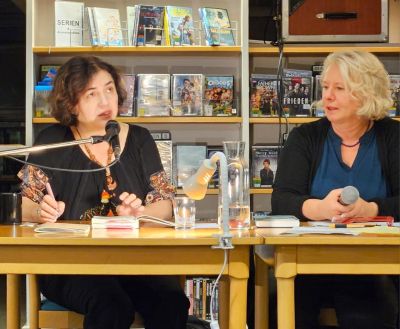

![Redakteur:innen von „COSMO [Radio] po polsku“. Von links: Tomasz Kycia, Adam Gusowski, Maciej Wiśniewski, Monika Sędzierska Redakteur:innen von „COSMO [Radio] po polsku“. Von links: Tomasz Kycia, Adam Gusowski, Maciej Wiśniewski, Monika Sędzierska](/sites/default/files/styles/width_100_tiles/public/00%20Redaktorzy%20prowadza%CC%A8cy%20audycje%20COSMO%20Radio%20po%20polsku.%20Od%20lewej%20Tomasz%20Kycia%2C%20Adam%20Gusowski%2C%20Maciej%20Wis%CC%81niewski%2C%20Monika%20Se%CC%A8dzierska.%20RBB%20Berlin%2C%202019.%20Copyright%20RBB.jpeg?itok=luTJDjgi)
